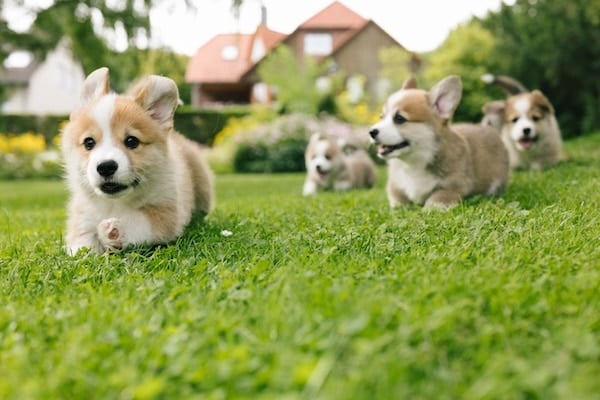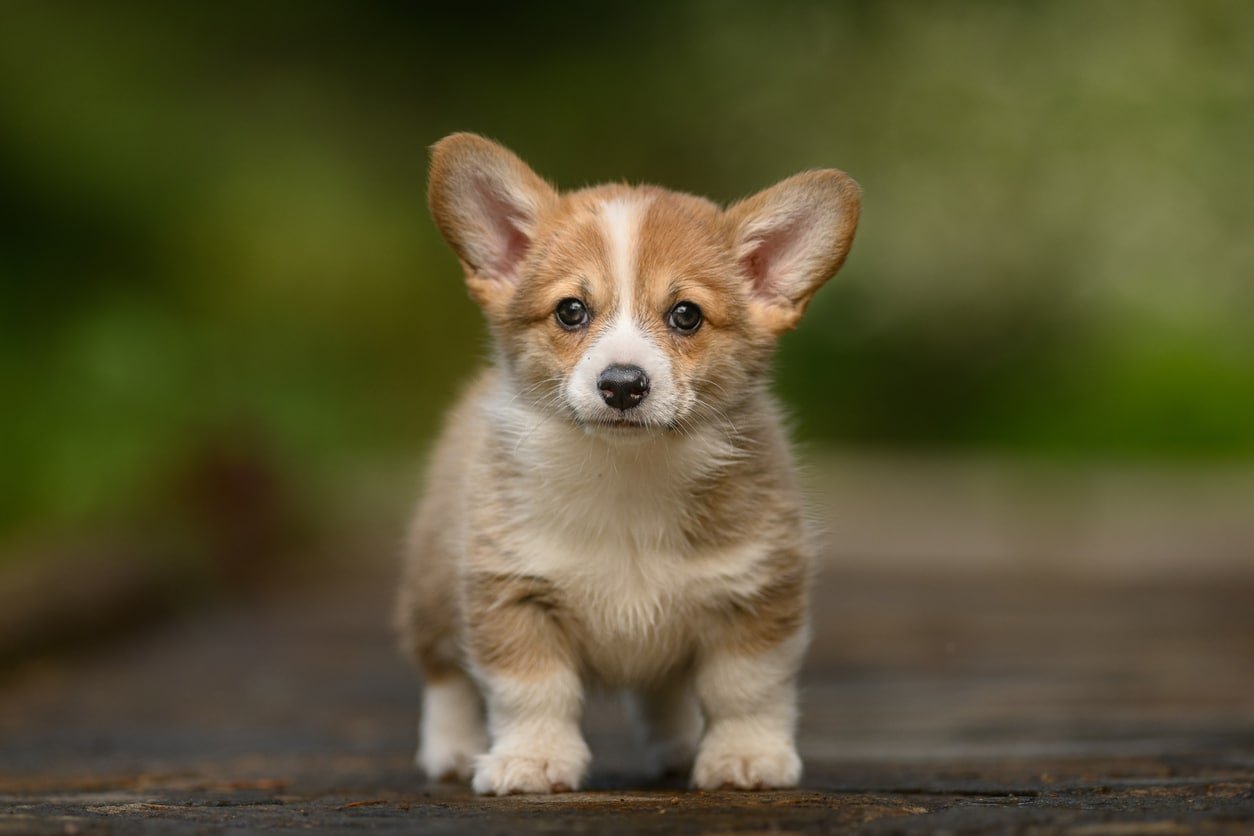Table of Contents
- Not a substitute for professional veterinary help.
Corgi puppies are irresistibly cute with their short legs, fluffy coats, and big floppy ears. As they grow, their soft fur develops into a thick, weather-resistant double coat, and their ears start to stand upright after about eight weeks.
These lively little pups are full of energy, giving way to a more stable, yet still playful, temperament as they get older. Known for their strong herding instincts, loyalty to their humans, and surprisingly deep barks, Corgi puppies are loving and spunky companions.
When searching for a Corgi pup, the American Kennel Club recognizes two distinct breeds of puppies: Cardigan Welsh Corgi puppies and Pembroke Welsh Corgi puppies. You can also find various mixes, like Cowboy Corgi puppies, which are a cross between the Australian Cattle Dog and Pembroke Corgi. Expect to pay between $1,500 and $2,500 for a Corgi puppy from a reputable breeder.
Considering adopting? Here’s what to know about finding a Corgi puppy, what to expect during the first months, and how to prepare for your new pup’s arrival.
Key Puppy Corgi Facts
- Litter size: The average litter size for Pembroke and Cardigan Corgis is between five to eight pups.
- Puppy weight: Corgi puppies typically weigh between 8 and 12 pounds by the time they head to their new homes, usually around 10 to 12 weeks old.
- Puppy temperament: These pups make for lively, playful, and affectionate companions. They enjoy spending time with their humans and respond well to training.
- Energy levels: These pups are high-energy and require ample outlets for pup-appropriate exercise and mental stimulation.
- Maturity: Corgi puppies reach their full height by the time they celebrate their first birthday. However, they may take up to two years to reach their full weight.
- Unique traits: Corgis are born with strong herding instincts, which often manifest through puppy behaviors such as nipping ankles and barking. Early foundational training is key for redirecting and managing these herding tendencies.
- Bonding likelihood: Socially, Corgi puppies are quite adaptable and form strong bonds with multiple family members. “They are happy dogs and tend to like most people,” says Pembroke breeder Yvette Huesler.
Where To Find Corgi Puppies
If you’re interested in adding a Corgi puppy to your life, it’s important to know where to look. Corgis are a very popular breed, which means prospective adopters may find themselves on a waiting list, especially if they’re looking for a specific color or gender.
- Show breeders: Pembroke breeder Joan Adams, owner of Llys Draig Kennel, emphasizes the importance of working with a preservation breeder who strives for the betterment of the breed. They should perform genetic health testing and be willing to take the dog back if life throws a curveball. To find directories of reputable breeders, check out organizations such as the Pembroke Welsh Corgi Club of America (PWCCA) or the Cardigan Welsh Corgi Club of America (CWCCA).
- Rescue groups: Breed-specific rescues, such as the Cardigan Welsh Corgi National Rescue Trust or the Pembroke Welsh Corgi Rescue, may have older puppies or adults who were returned due to behavioral issues or changes in their guardians’ lives. Occasionally, shelters have Corgis in need of homes, though you might face availability challenges.
- Online marketplaces: Finally, online marketplaces such as AKC Marketplace and Good Dog can help you find responsible breeders. However, be vigilant for red flags indicating puppy mills, such as a rushed buying process or a refusal to let you meet the parents.
Recommended health tests
The PWCCA requires breeding dogs to undergo OFA hip and eye clearances. “Hip dysplasia is a painful disorder,” says Huesler, emphasizing the importance of finding a breeder who’s transparent about genetic testing.
Corgi breeders may conduct additional health tests, including:
There are also tests that are specific to Pembroke Welsh Corgis, including:
Some disorders are more common in Cardigan Welsh Corgis, such as:
When talking to breeders, the PWCCA recommends asking the following health questions:
- Did the sire and dam have their hips certified with a fair, good, or excellent rating by OFA?
- Are the eyes certified by the Canine Eye Registry Foundation (CERF) or passed by a certified veterinary ophthalmologist?
- Have the puppies started a vaccination and worming program?
- Are there any other health concerns in this bloodline?
- Have the puppies been examined by a veterinarian for general health?


fotografixx via iStock
Corgi Puppy Physical Characteristics
Of the two Corgi breeds, Cardigans are more robust and have long tails. Pembrokes are slightly smaller and have a naturally bobbed or docked tail. Both Corgi puppies grow quickly in their first few months, reaching their full height by one year (though it may take them longer to fill out).
The Corgi’s signature short stature is adorable, but being so low to the ground means pet parents must be careful about leaving anything toxic or dangerous on the floor. These curious puppies enjoy exploring and will eat almost anything they find lying around.
| Age | Approx. height | Approx. weight | Tips |
| 8 weeks | 4-6 inches | 8-10 pounds | Keep very young Corgis in a few puppy-proofed rooms before giving them free rein of the house. Introduce crate-training for a safe space. |
| 12 weeks | 5-7 inches | 10-13 pounds | By 12 weeks, Corgi puppies become bolder and are eager to explore. Watch them around stairs and discourage jumping off furniture to protect their developing spines. |
| 6 months | 7-8 inches | 17-24 pounds | At this stage, pups can transition from three daily meals to two meals per day. Continue socialization and obedience training. |
| 1 years | 10-12 inches | 25-30 pounds | Corgis are completely grown at this point; keep in mind that they can access more areas at their full height. Some Corgis, however, may take up to 2 years to fill out and reach their full weight. |
Raising a Well-Adjusted Corgi Puppy
All puppies need special care, but there are some specific considerations when it comes to Corgi pups. These include training and socializing a puppy with herding and protective instincts, providing ample mental and physical enrichment for their energetic needs, and getting them comfortable with handling and grooming to care for their dense double coats.
Breed-specific training needs
Corgis were bred to herd livestock, and this instinct starts in puppyhood. It’s important to teach your Corgi puppy not to herd or nip at the heels of small children and other pets. Providing appropriate herding outlets can help you redirect the behavior and meet your Corgi’s breed-specific needs.
The PWCCA recommends training Corgis to use stairs and dog ramps to access furniture at an early age to prevent adding stress on their spine. You’ll also want to teach your puppy not to jump from high places.
As natural watchdogs, Corgis tend to be quite vocal. Having strategies in place to manage excessive barking will make for a happier household.
Socialization
Corgis have a bold, confident personality—and once in a while, that can lead to conflict with other dogs. It’s important to introduce your Corgi puppy to different breeds of all shapes, sizes, and personalities early on to help them navigate social situations smoothly.
While Corgis are generally friendly, they tend to be cautious around new people. It’s a good idea to socialize puppies with strangers and house guests to prevent wariness from developing.
It’s also wise to help your Corgi puppy make friends with the vacuum—they’ll be seeing a lot of it during shedding season. You can acclimate puppies to the loud sound by vacuuming for short periods while rewarding them with treats.
Potty training
Corgis tend to be tidy creatures, says Pembroke breeder Michael Higgins, adding that 90 percent of Corgi puppies take to potty training quickly. He recommends using a dog pen with puppy pads, so young puppies can exit their crate at night to potty if necessary.
A consistent schedule with frequent potty breaks will expedite the process, as will lots of positive reinforcement. Higgins recommends rewarding puppies with outdoor playtime after they potty.


Dmitriy Kostylev via iStock
Crate training
Because Corgis are prone to separation anxiety, early crate training is recommended. However, you’ll want to ensure your puppy develops positive feelings toward the crate first, so they don’t associate it with you leaving or other negative experiences.
Fortunately, Higgins says this process is usually a snap. “They love their crates as a shelter, as long as it is not used for punishment or prolonged periods,” he says. Keep the crate door open during the day to encourage your puppy to explore it. You can also toss treats and toys inside the crate to build a positive association, and feed meals inside to reinforce the behavior.
Lifestyle, exercise, and activities
Corgi puppies are energetic and spirited dogs who require a lot of exercise, mental stimulation, and, of course, attention. “They love to be involved,” says Higgins. “They love having something to do.” You can keep your Corgi puppy busy with long walks, agility practice, and interactive play. These pups also benefit from activities that engage their brain, such as puzzle toys, nosework, and trick training.
Just be careful not to overdo it—it’s crucial to avoid straining their backs, especially while their growth plates are still developing. Building up their exercise gradually will help protect their spine and keep them healthy and safe.
Grooming Routine for Corgi Puppy
Eventually, your fuzzy pup will sport a thick double coat that sheds a fair amount every day. Introduce them to deshedding tools early on so they don’t represent something scary. Since they have such a thick coat, you may also want to acclimate puppies to the sound of the hairdryer.
Many Corgi parents emphasize that these pups need extra care with desensitization to handling. “They do not like their feet messed with, so you have to train them to tolerate the guardian touching all parts of their body,” says Adams. Gently touch your puppy’s paws, ears, tail, and mouth, all while offering treats and praise.
Health Considerations
Corgi puppies are generally healthy, but their long, low-slung bodies put them at risk of some orthopedic issues. Pet insurance is often recommended to cover potential health problems.
As your Corgi puppy matures, monitor them for signs of intervertebral disc disease (IVDD), a condition that affects the spine. Additionally, Corgis tend to gain weight easily, so watching their waistline is crucial to avoid joint strain. Regular exercise, good puppy nutrition, and feeding on a schedule will all help to keep your pup at a healthy weight.
Finally, don’t neglect your puppy’s teeth. Smaller breeds are prone to dental problems, so it’s essential to introduce your Corgi to the feel and taste of toothpaste and toothbrushes from an early age.
Essential Corgi Puppy Checklist
If you’re thinking of adopting a Corgi puppy, there are a few things to have on hand before bringing your new bundle of fluff home:


